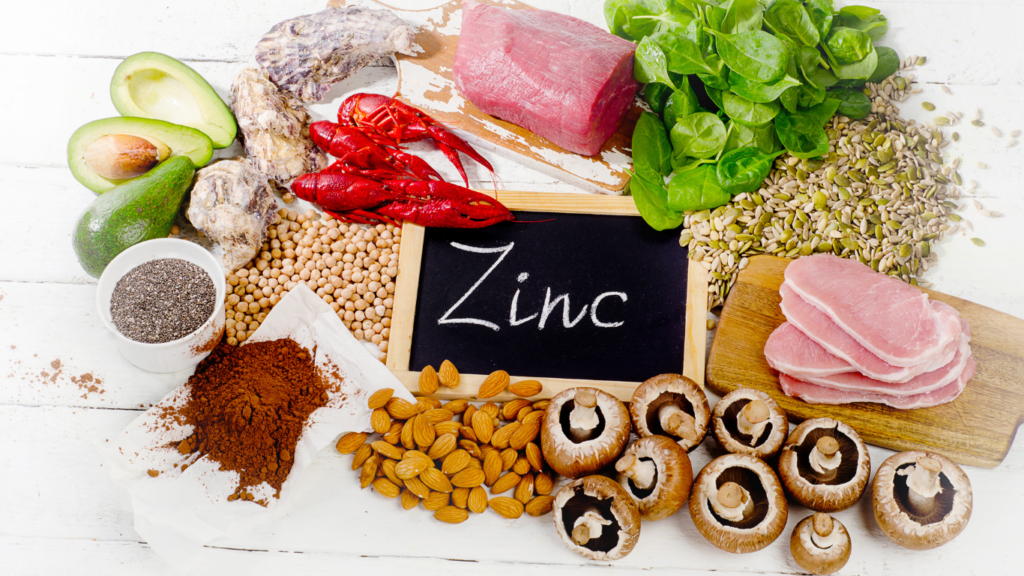Zinc Dosage Side Effects Uses Misuse Overdose & More All you need to know
Zinc or Zn is considered an essential trace element as your body does not require a large amount of zinc to be healthy. Your body is unable to produce it. There are foods and supplements containing zinc that you can take. Zinc is necessary for proper growth and development in children. It also plays an essential role in supporting the immune system.
Many conditions can be treated by taking zinc supplements, such as Zn deficiency, common cold, Wilson disease, and many more.
In this article, we will discuss how zinc works, its clinical indications, dosage, side effects, and contraindications.

Generic name: Zinc
Common brand names:
- Galzin
- ZnCl2
How does zinc work?
For the body to grow and function, zinc is needed. It helps in carrying out different functions of the body, such as thyroid function, wound healing, clotting of blood, and immune function.
It is present in the eye and helps to maintain vision; zinc deficiency can lead to changes in vision.
Clinical indications
Zinc is used in the treatment of the following conditions:
- Zinc deficiency
- Common cold
- Wilson’s disease (an inherited disorder in which copper accumulates in the body)
- Age-related macular degeneration (eye disease)
- Diarrhea
- Wound healing
- Acne
- Acrodermatitis enteropathica (a disorder characterized by zinc deficiency)
- Attention deficit hyperactivity disorder (ADHD)
- Depression
- Foot ulcers
- Osteoporosis (bone disorder)
- Sickle cell disease
- Vitamin A deficiency
- Warts
- Leg ulcers
- Bedsores
- Muscle cramps
- Hypogeusia (taste disorder)
- Gingivitis (gum disease)
- Diaper rash
- Burns
- Leprosy
- Herpes labialis (cold sores)
- Diabetes
- Anorexia nervosa (eating disorder)
- Peptic ulcers
- Leishmania lesions (skin infection by leishmaniasis)
- Bad breath
Zn helps in the prevention of:
- Pneumonia
- Preterm delivery
- Peptic ulcers
- Colon and rectum tumors
Dosage
Recommended dietary allowance (RDA)
Recommended dietary allowance (RDA) of zinc for people of different ages and gender is given below:
- 0-6 months
Male: 2mg
Female: 2mg
- 7-12 months
Male: 3mg
Female: 3mg
- 1-3 years
Male: 3mg
Female: 3mg
- 4-8 years
Male: 5mg
Female: 5mg
- 9-13 years
Male: 8mg
Female: 8mg
- 14-18 years
Male: 11mg
Female: 9mg
Pregnancy: 13mg
Lactation: 14mg
- 19 years and above
Male: 11mg
Female: 8mg
Pregnancy: 11mg
Lactation: 12mg
Dosage for adults
- Zinc deficiency
Mild deficiency: Recommended dietary allowance (RDA) of Zn twice or thrice a day for 6 months.
Moderate to severe deficiency: Recommended dietary allowance (RDA) of Zn four to five times a day for 6 months.
- Diarrhea
Oral: Pregnant women taking 15mg Zn when 10-24 weeks have passed (supplements are continued until one month after birth).
- Wilson’s disease
Oral: Zinc acetate (Galvin) containing 25-50mg Zn three to five times a day.
- Muscle cramps
Oral: 220mg Zn sulfate twice a day for 12 weeks.
- Acrodermatitis enteropathica
Oral: 2-3mg/kg elemental Zn daily.
- Age-related macular degeneration
Oral: 80mg elemental Zn combined with copper, vitamin E, and beta-carotene for 5 years.
- Common cold
Oral: Zinc acetate or gluconate lozenge having 4.5-24mg elemental Zn every two hours.
- Depression
Oral: 25mg elemental Zn once a day for 12 weeks.
- Leishmania lesions
Oral: 2.5-10mg/kg Zn sulfate divided into three doses for 14 days.
- Peptic ulcers
Oral: 300-900mg zinc acexamate divided into one to three doses for 1 year or 220mg Zn sulfate thrice a day for 3-6 weeks.
- Sickle cell disease
Oral: 220mg Zn sulfate thrice a day or 50-75mg elemental Zn divided into two doses for 2-3 years.
- Osteoporosis
Oral: 15mg zinc combined with manganese, copper, and calcium.
- Diabetes
Oral: 25mg zinc gluconate twice a day for 8 weeks in type 2 diabetes. 30mg zinc gluconate once a day for 6 weeks for a pregnant woman having diabetes.
- Colon and rectum tumors
Oral: 30mg zinc combined with selenium and vitamins for 5 years.
- Anorexia nervosa
Oral: 14-50mg elemental Zn once a day.
- Hypogeusia
Oral: 140-450mg zinc gluconate divided in three doses daily for 4 months or 25mg elemental Zn for 6 weeks.
Intravenous: Addition of zinc solution to 10L of dialysis for 12 weeks.
- Leg ulcers
Oral: 220mg Zn sulfate thrice a day with ulcer dressings.
Topical: Zinc oxide pastes daily for 8-12 weeks.
- Warts
Oral: 400-600mg zinc sulfate for 2 to 3 months
Topical: 20% zinc oxide ointment twice a day for 3 months or 5% to 10% Zn sulfate thrice a day for a month.
- Acne
Oral: 30-150mg elemental Zn .
Topical: 1.2% zinc acetate with 4% erythromycin.
- Bedsores
Oral: 30mg Zn once a day for 3 weeks.
Topical: Zn oxide paste daily for 8-12 weeks.
- Bad breath
Oral: Mouth rinses containing zinc once or twice a day for 7 days.
- Cold sores
Topical: 0.025-0.25% Zn sulfate 8-10 times a day or 0.3% Zn oxide with glycine every two hours.
- Gingivitis
Topical: Toothpaste having 0.2-2% Zn citrate twice a day for 7 months or mouth rinse having 0.4% Zn sulfate and 0.15% triclosan.
- Burns
Intravenous: Solution containing 574mcmol Zn , 59mcmol copper and 4.8mcmol selenium.
Dosages for children
- Anorexia nervosa
Oral: 14-50mg elemental Zn .
- Acrodermatitis enteropathica
Oral: 2-3mg/kg elemental zinc daily.
- Attention deficit hyperactivity disorder (ADHD)
Oral: 55-150mg Zn sulfate having 15-40mg elemental Zn once a day for 6-12 weeks.
- Common cold
Oral: 10-23mg zinc gluconate in lozenge every two hours for 10 days or syrup having 15mg zinc twice a day for 10 days.
- Diarrhea
Oral: 10-40mg elemental Zn once a day for 7-15 days.
- Sickle cell disease
Oral: 10mg elemental zinc once a day for a year for children (4-10 years). 15mg elemental zinc twice a day for a year for 14-18 years old boys.
- Pneumonia
Oral: 10-70mg elemental zinc once a day for 3 months-5 years malnourished children. 2mg/kg Zn sulfate in two doses for 5 days.
- Leg ulcers
Oral: 220mg zinc sulfate thrice a day with ulcer dressings.
- Food poisoning
Oral: Multivitamin syrup having 20mg elemental Zn divided into two doses for 2 weeks.
- Acne
Topical: 1.2% zinc acetate with 4% erythromycin twice a day for 3-10 months.
- Leishmania lesions
Intravenous: 2% zinc sulfate for 6 weeks.
- Diaper rash
Oral: 10mg zinc from 1 or 2 days after birth for 4 months.
Topical: A paste containing 47% zinc oxide for 5 days.
Take the drug as it is prescribed by your doctor. Do not change your dose without their consultation.
Do not stop it without the consultation of your doctor. Do not keep taking the drug when the specified period of treatment has passed.
In case of a missed dose, take it as soon as you remember it. If the time for the next dose is near, skip the missed dose.
Do not take a double dose to make up for the missed dose.
Route of administration
Zn can be administered:
- Orally
- Topically
- Intravenously
Side effects
If you are taking Zn you may develop the following side effects:
- Nausea
- Vomiting
- Abdominal pain
- Dyspepsia (indigestion)
- Headache
Long-term intake of high levels of Zn eads to a deficiency of copper in the body as it reduces the absorption of copper from the gastrointestinal tract. Low immunity and low blood levels of high-density lipoprotein (HDL) are also caused by long-term exposure of the body to zinc.
Contraindications
Zinc is contraindicated in people who are allergic to it.
Drug interactions
Following are the drugs that interact with Zn .
Major interactions
It is advised to not take the following drugs with Zn.
- Penicillamine
Penicillamine is used in the treatment of rheumatoid arthritis and Wilson’s disease. Zn decreases the absorption of penicillamine. Thus, taking it with Zn reduces its effectiveness.
Moderate interactions
If you are taking the following drugs, you should be careful.
- Quinolones
Quinolones are antibiotics. Zn reduces the effectiveness of these antibiotics as it reduces their absorption in the stomach.
- Tetracyclines
Tetracyclines are antibiotics. When taken with Zn , their absorption is reduced as Zn gets attached to them in the stomach. This leads to their reduced efficacy.
- Cisplatin
Cisplatin is used in the treatment of cancer. Its effect on the body increases if it is taken with Zn .
- Integrase inhibitors
Integrase inhibitors work against the Human immunodeficiency virus (HIV). If taken with Zn, their blood levels are decreased, which results in their reduced effect on the body.
Minor interaction
If you are taking the following drug, you should be careful.
- Amiloride
Amiloride is used in the treatment of high blood pressure and heart failure. Taking zinc with it can lead to an increased level of zinc in the body. This can cause Zn toxicity to occur.
Overdosage
Do not exceed the prescribed dosage of the drug. Overdosage of Zn leads to:
- Nausea
- Severe vomiting
- Stomach pain
- Restlessness
In case of overdosage, get immediate medical care.
Storage
For storing zinc, take the following measures
- Keep it in the container it came in.
- Keep it at room temperature in a place devoid of sunlight, moisture, and heat.
- Keep it out of reach of children.
- Dispose of it carefully so other people and children cannot have access to disposed medicine.



